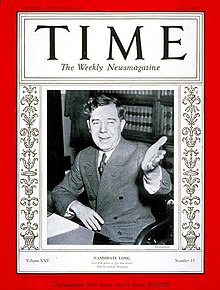He stormed into the world’s greatest deliberative body in 1932 after it had already been in session for two months. In a room full of men in dour blue suits, Huey wore “flashy brown tweeds, beautiful white shirts of the finest fabric with his monogram embroidered on one sleeve, a bright red silk necktie, and, according to one chastising reporter, ‘a handkerchief regrettably on the pink side.”
It wasn’t long, pun intended, before the Senate figured out that they had a real problem on their hands.
But soon enough there was another fellow in the capital who was even more worried about the storm from the bayou.
President Franklin Delano Roosevelt.
Franklin Roosevelt was certainly a visionary. He knew things for sure long before others came around to his point of view. He saw Huey Long as a self-obsessed man with huge ambitions who would stop at nothing to get what he wanted, even if it meant damaging the country. Like challenging Roosevelt for the nomination in 1936 or running as an independent, splitting the Democratic vote, and throwing the country to the Republicans for four years so that Huey could win the White House in 1940.
Which, as it turns out, was exactly what Huey Long was planning to do.
Sources
Long, Huey P. “My First Days In The White House.” Pickle Partners Publishing, 2016.
U.S. House Archives. “Hattie Wyatt Caraway.” Retrieved from https://history.house.gov/People/Listing/C/CARAWAY,-Hattie-Wyatt-(C000138)/ on July 29, 2022.
White, Richard D. “Kingfish: The Reign of Huey P. Long.” Random House, 2009.




No comments:
Post a Comment
Note: Only a member of this blog may post a comment.